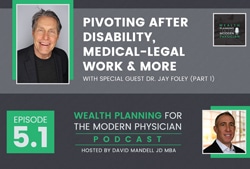In this episode, host David Mandell interviews orthopedic surgeon Dr. John “Jay” Foley about his path to medicine and how he built a thriving practice. Jay also recounts a life-changing snowboarding accident that forced him to reconsider his career. This is part one of a two-part conversation where they dive into Jay’s journey post-injury.

(Video Available September 19, 2024)
David begins with questions he asks all physician guests to the program– about their initial interest in becoming a physician, early career journey and more. Jay explains what got him interested in orthopedics at a young age, about how he spent a few years as a seasonal surgeon between the mountains and the beaches, before settling down in Reno, Nevada.
David learns from Jay how he built a busy orthopedic practice in two locations, emphasizing his flexibility and willingness to take call as key drivers to build his practice early on. He also notes how his practice grew steadily over the years.
The conversation shifts as Jay explains his fateful snowboarding accident on his birthday at age 58, which he knew instantly created a disability that would keep him from performing surgery for years, if not permanently.
For the remainder of this first part of a two-part episode, Jay tells David about his immediate reactions to the injury, both practical and emotional. In part two, they discuss Jay’s career transition and successes he has had.
TAKEAWAYS:
Takeaway 1: Healthcare professionals must be prepared for sudden career changes due to physical disability
Dr. Jay Foley, a successful orthopedic surgeon, faced a sudden career-changing event when he suffered a serious shoulder injury during a skiing trip. This accident resulted in a multi-tendon rotator cuff tear, the kind of injury that could potentially end a surgeon’s career. Foley revealed how he knew instantly that “everything had changed.” He understood the implications of his injury and how it would affect his ability to perform surgeries.
“I knew exactly what I did, what I needed to have done, what had to change,” he explained. “And we, as orthos, are so calculating in terms of, we know exactly what the problem needs, and how long it takes to recover. I knew a multi-tendon rotator cuff tear in a 58-year-old surgeon was going to be a while.. If ever I could get back into doing that.”
Takeaway 2: The importance of having a solid disability insurance policy
Jay stressed the importance of maintaining a robust disability insurance policy. His own policy provided a financial safety net while he was unable to work, allowing him to focus on recovery and planning for the future. He realized that his disability insurance would be a critical factor in weathering this crisis, giving him the assurance that he would be able to maintain his lifestyle and responsibilities.
“I knew I had a disability policy, I was 58, and I had a good career, even though careers start late in orthopedics, for the most part, we don’t earn money early, and I kind of knew that the roller coaster, or the treadmill of medicine was getting out of control in the late teens, 2015 into 2020, things were rapidly changing in the state of California, my practice, our hospital, and basically, I knew this was going to get me off that type of treadmill, and that I had to figure something else out,” he said.
Takeaway 3: Adapting and moving forward in the face of adversity
Despite the physical and career challenges, Jay showed resilience and adaptability in face of adversity. He approached his situation with a positive mindset, acknowledged the reality of his condition, and focused on the next steps to keep his career going. He noted that his emotional health was good and he was financially secure, which are key factors in successfully dealing with such life-changing events.
“Emotionally, I was in a good state. I just knew that I had young kids, what am I going to do until they graduate from high school? I wanted to figure other things out, and needed to do without doing surgery in order to keep that disability policy going,” he said. His experience underscores the importance of preparedness, resilience, and adaptability, especially in professions with high physical demands.
INSIGHTS
- Jay shares his background, growing up in Danvers, Massachusetts, and his educational journey through Harvard and the University of Cincinnati.
- He discusses his early interest in orthopedics, influenced by sports injuries and an engaging local orthopedic doctor.
- He emphasizes the importance of choosing a career that suits one’s skills and interests, recalling how the use of dictaphones in orthopedics attracted him.
- Jay recounts his early career, balancing work in ski towns like Truckee in winter and Cape Cod in summer, before settling in Truckee full-time in 1996.
- He explains the varied nature of his orthopedic practice, handling everything from sports medicine to joint replacements and trauma surgery in a small community.



